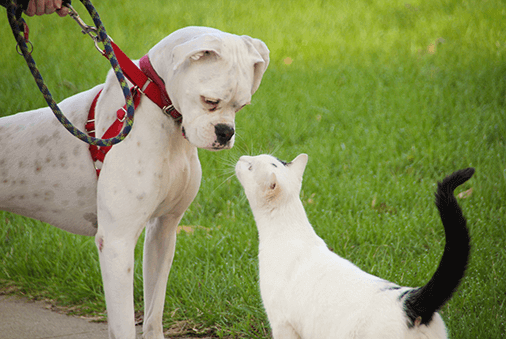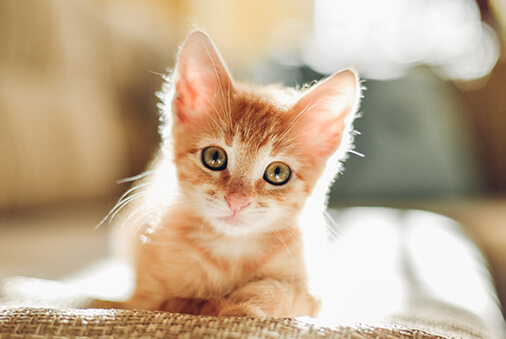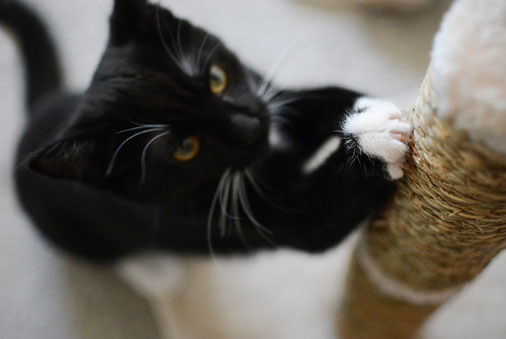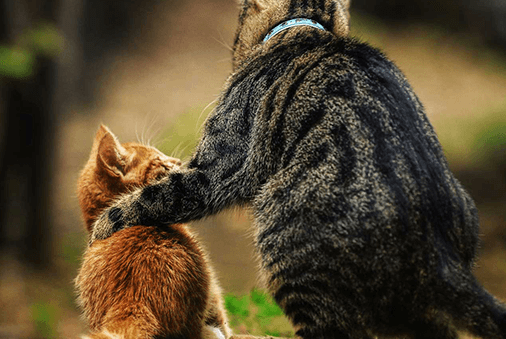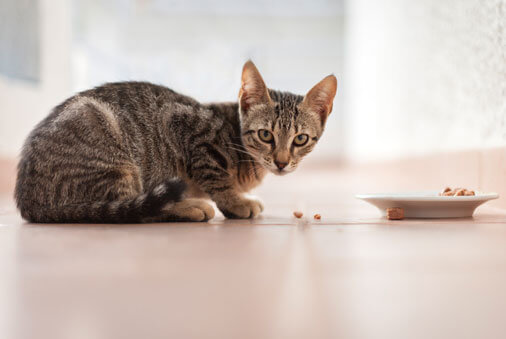Your Kitten’s Growing!
3 healthy meals a day
Your kitten’s food preference is pretty much set in stone (read: tuna) by the time she’s six months old, so the earlier you can get her to eat a high-quality, natural and nutritiously balanced diet, the better.
Variety is everyone’s spice of life so serve her two or three different wet and dry formulas, in different flavors, three times per day.
Feeding tips
Throw away canned leftovers that have been opened for more than 30 minutes.
Dry kitten food can be left out all day: It won’t go bad and your kitten won’t wolf it down in one sitting.
Watch out for canine food thieves. Keep kitten food out of a pup sibling’s reach or it’ll get eaten with his dog food.
Have fresh, clean water available at all times; wash and refill your kitten’s water bowl daily.
Don’t fall for the “saucer of milk” myth: Cats can’t digest cow’s milk easily and it can cause diarrhea. Stick to water.
Continue “treating” good behavior well but don’t let treats make up more than 5% of your kitten’s daily diet.
Kitten Care
Ongoing vet visits
By the time they’re 6 months old, female kittens should be spayed and male kittens neutered.
Ask your veterinarian about special diets that may help prevent or improve a common condition in both male and female felines: Feline Lower Urinary Tract Disease (FLUTD).
Some signs your kitten may have FLUTD:
- Makes frequent trips to the litter box
- Appearnce of blood in the urine
- Straining or crying upon urination
- Can’t void and appears constipated
Healthy Dental Hygiene
Like humans, a kitten's first set of teeth are replaced by her adult teeth. While your veterinarian will check your kitten’s gums and teeth, it’s important to keep up with dental care regularly at home.
If there’s an unusually strong odor coming from your kitten’s mouth, she loses her appetite or starts pawing at her mouth or face, there might be more serious dental issues that need to be addressed with your vet.
Tooth Brushing Tips:
- Start early: Give your kitten a pet toothbrush to play with so she associates it with a positive experience.
- Have your kitten lick tuna water or chicken broth off your finger as you ease it into her mouth and gently rub her teeth and gums.
- Work up to using special toothpaste created specifically for pets on your kitten’s own toothbrush — focusing on her gum line.
- Try alternatives: Special dry food, treats and toys that are designed for dental health.
Hissy fit behavior?
Your kitten might begin to act aggressively; if so, bring her to the vet to rule out any illness or injury.
Stress can also cause aggression. If you notice her behavior getting worse it could mean your kitten has pent-up energy she needs to expend in playful exercise.
If she becomes aggressive while playing with another furry friend, clap your hands calmly or make another loud noise to redirect their attention.
Your kitten’s body language will let you know when she’d rather not be touched or she’s becoming angry. Watch her behavior over time and always consult your veterinarian when negative actions persist without alleviation.
Signs of an anxious, annoyed kitten
- Pupils constricted, ears back
- Raised tail, raised fur on shoulders
- Tail swishes or thumps the floor
- Tail wrapped tightly around legs, sitting like a statue
- Stiff legs and a lifted rear end means she’s ready to rumble
Learn more about the next important stage in your kitten's life.


